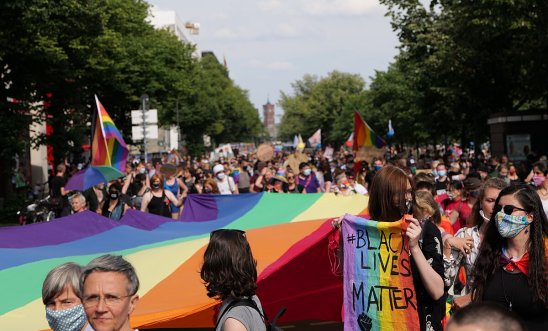
Pride is a Protest - in solidarity and in defiance

Why this year I’ll be at the Dyke March and not ‘Pride in London’.
By Georgie White
Pride has always been a protest. Around the world, brave queer people make themselves visible, often in dangerous climates, to stand up for their rights, their identities, and their very existence.
By working together in solidarity, queer activists have achieved incredible things through protest. One prominent example is the AIDS Coalition To Unleash Power (ACT UP), a ‘diverse, non-partisan group of individuals united in anger and committed to direct action to end the HIV pandemic.’ ACT UP led legendary direct actions, including road blockades and 'die-ins.' Their motto, 'Silence = Death,' reflects their refusal to remain silent. ACT UP's activism significantly contributed to better government funding and health policies for people living with HIV and AIDS. In Scotland, for example, one of ACT UP's largest protests blocked traffic outside St Andrew’s House, the Scottish Government Office. This action gained significant media coverage and engagement with MPs, leading the government to meet demands for more equitable funding within a few months. Today, ACT UP continues their activism by supporting the people of Palestine with their ‘Fund Healthcare Not Warfare’ campaign, highlighting the importance of collective liberation.
Pride events serve many purposes: to protest, to share joy, and, of course, to take pride in the diversity of our identities. However, larger and more mainstream Pride events have faced criticism from grassroots activists for moving away from the movement’s core values in favour of corporate sponsorship. These sponsors often include companies that invest in fossil fuels, arms manufacturing, or profit from migrant deportations. Anyone who has attended a major Pride parade in recent years will have seen the advertising of massive corporations plastered on the side of a float and even the police waving their rainbow flags. It makes me wonder: who is this really for?
At a time when marginalised groups are under increased attack, it’s more important than ever to say - not in our queer names.
The good news is, radical queer activism is flourishing everywhere. There are so many alternatives to mainstream Pride events, such as joining Queers for Palestine at national demonstrations, participating in Trans Pride in Brighton, UK Black Pride, or supporting Lesbians and Gays Support the Migrants. This year I am most looking forward to joining the Dyke March. ‘Dyke,' once a slur, has been reclaimed by many as overtly feminist, trans-inclusive, and political. And the Dyke March is just that; it is organised by ‘radical dykes from intersectional backgrounds, and racialised, trans, migrant, and disabled lived experiences’, who stand for liberation and freedom, including a Free Palestine, trans liberation, sex-worker liberation, class liberation, and so much more. As Stav B, artist, activist, and Dyke March co-organiser, says, “Dykes have always been around and will always be around, surviving, living, creating, struggling, fighting, achieving, loving, dancing, working, and doing it.”
I recently joined the Amnesty Feminist network as a volunteer campaigner because of my passion for gender justice. I have seen and felt the increasingly hostile environment that women, people of colour, queer, and trans people are experiencing right now in the UK, including incidents of far-right and police violence. Amnesty Feminists have always understood the importance of standing in solidarity with all marginalised communities, and we will continue to fight for justice for all.
Our blogs are written by Amnesty International staff, volunteers and other interested individuals, to encourage debate around human rights issues. They do not necessarily represent the views of Amnesty International.
0 comments